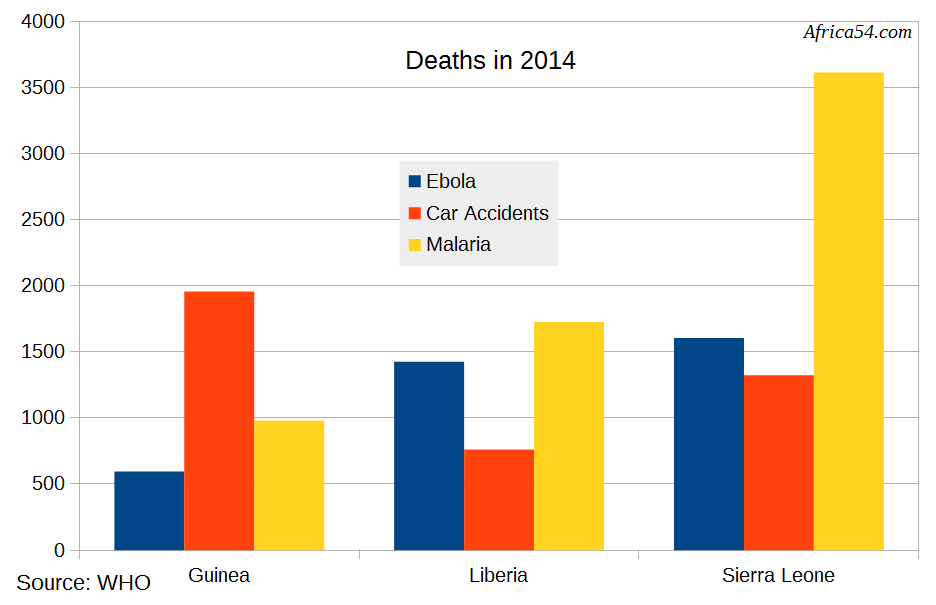Yahoo Travel asked for my opinion on the 2014 Ebola Outbreak.
Here's what I told them.
I've updated this on Sept 20, 2014.
First some background on me:
- I was in Liberia, Sierra Leone, and Guinea from July to September 2013 - so a few months before the March 2014 Ebola outbreak.
- I'm in Benin. Then I'll spend October 2014 traversing Nigeria to Cameroon (see map on right).
- I'm spending 4 years visiting all 54 African countries.

Should You Be Afraid of Ebola?
The outbreak does give me pause, but only for about 5 seconds.
It's easy to get excited about this outbreak, but it's important to have perspective:
- So far, over 2,500 people have died of Ebola during 2014 in Sierra Leone, Guinea, and Liberia.
- Annual auto fatalities in Guinea (1,956), Sierra Leone (1,323), Liberia (760) total 4,039.
- Therefore, the average person in those three countries is more likely to die in a traffic-related accident than by Ebola.
- Yet, almost nobody in those countries wears seat belts (many cars don't even have working seat belts).
- So if we want to save the most African lives, why don't their governments mandate wearing seat belts and improving their road conditions?
- Nobody will worry about me going to Eritrea because it's on Africa's east coast (far from the outbreak). However, according to the WHO, Eritrea has the worst road fatality rate in the world (12 times worse than the UK and twice as deadly as Liberia). In other words, if I go to Eritrea, I'm more likely to die in a car accident than to die of Ebola in Liberia.
- Another way of thinking about it: those three countries have 22 million people. "Only" 2,500 have died. Thus, Ebola has killed 0.01% of the population. Your chance of dying from Ebola when you are in one of those 3 African countries is one in 10,000. That's better odds than the lottery, but it won't make me lose sleep.
- Remember that we're just looking at the 3 most-affected countries. If you are in Nigeria, Senegal, or anywhere else on the planet, then you're far more likely to get hit by lightning.
In short, we need to keep a perspective. It's like people worrying about shark attacks or lightning strikes, yet they think nothing of driving 50 miles a day or smoking. They worry about flying, but not about driving.
Malaria vs. Ebola
Malaria kills far more than Ebola. According to the WHO, here are the annual deaths due to Malaria in 2012: Guinea 979 + Sierra Leone 3,611 + Liberia 1,725 = 6,315!
That means more than twice as many people have died of malaria in those 3 countries than of Ebola.
Shouldn't that be the big news? Shouldn't we make a huge effort to stop malaria?
Instead of spending $1 billion on giving everyone mosquito nets, the WHO wants to spend it on Ebola.
If Ebola regularly killed 4,000 people per year, we'd get used to that just like we are used to malaria killing 6,315 per year and auto fatalities killed 4,029 people per year. We can reduce all of these deaths if we encourage people to take preventative measures.
Of course, malaria isn't contagious. Ebola is. So we're comparing apples to oranges. However, both are preventable.
But Ebola is growing exponentially!
Yes, it's true (see the graph on the right).
However, the graph on the right also shows that only in Liberia is there truly explosive growth.
Elsewhere, Ebola is flatlining, as victims are quarantined.
Yes, traffic accidents and malaria are not growing exponentially. However, as the other graph above demonstrates, Ebola is not the deadliest thing in those three countries.
It's tempting to continue drawing the exponential line of Liberia, but past performance doesn't indicate future results. Past outbreaks of Ebola had a similar slope at the onset. Each time we contained them and the graph came crashing down.
Of course, we need a bit of hysteria to spring people to action.
However, the only people who really matter are the government officials and health care workers.
In other words, the average people from Benin or the USA have little to worry about and there's little they can do anyway.
Ebola's Fatality Rate Myth
 The BBC regularly reports that Ebola's "fatality rate can reach 90%."
The BBC regularly reports that Ebola's "fatality rate can reach 90%."
That's misleading. Yes, it can reach that high, but the average fatality rate is about 52%. That's still horrible, but it's not a guaranteed death sentence. If you catch and treat it early, you improve your odds.
On the other hand, when a leading doctor died of Ebola, I was discouraged. You'd think that he, of all people, would not only be carefully monitoring himself but also that at the first signs of symptoms, he would treat himself aggressively. Yet he died.
My Advice
- Don't eat bush meat (or any meat, frankly).
- Don't worry about visiting an Ebola-infected country.
- If you do, consider wearing plastic gloves.
- Either take anti-malarial medicine or always have the treatment for malaria with you.
- Wear a seat belt whenever possible.
2020 Update
I wrote this article in September 2014 when we were in the middle of the Ebola pandemic. About 2,500 had died at that point.
At that time, many pundits were hysterical about Ebola.
The CDC's worst-case scenario claimed that "Liberia and Sierra Leone will have approximately 550,000 Ebola cases (1.4 million when corrected for underreporting." Given that the fatality rate was about 50%, that would mean 700,000 deaths in just those two small countries!
Assuming it started spreading worldwide, we'd have hundreds of millions of dead.
When the dust settled, 11,323 people died of Ebola during the 2013-2016 pandemic. That's a bit less than hundreds of millions.
In November 2014, others started realizing that Ebola was overhyped. For example, Information Week observed that it's 20 times more likely that a cow kills you than someone dying of Ebola.
By 2015, journalists realized that the doomsday Ebola predictions were ludicrously inaccurate.
Lessons for COVID-19?
I'm writing this in August 2020. We're in the middle of the Coronapocolypse. Doomsday prophets are once again forecasting hundreds of millions of deaths.
Although COVID-19 is far less lethal than Ebola (1% death rate vs. 50% death rate), it spreads far more easily. As a result, it kills far more people. Ebola killed 11,323 victims in three years while COVID-19 will kill over one million in one year.
In March 2020, I wrote an article and did a podcast called "Don't Worry About the Coronapocolypse." That title alludes to this article about Ebola. Although the scale is vastly different, the principle remains: don't overestimate the probability that you will die and ignore the worst-case scenarios that scaremongers tout. They will be wrong again. There will not be hundreds of millions of deaths.
I bet that cumulative COVID deaths will be less than 5 million by the end of 2021. That's a horrifying number, but better than 50 or 500 million.
To put that 5 million number is perspective, 5.5 million people die from communicable diseases every year. Therefore, if COVID ends up killing 5 million in two years, it will have raised the communicable disease death toll by 50%. That's tragic and far worse than Ebola, but if you think we should panic about those 5 million deaths, then we should panic whether COVID-19 exists or not.






